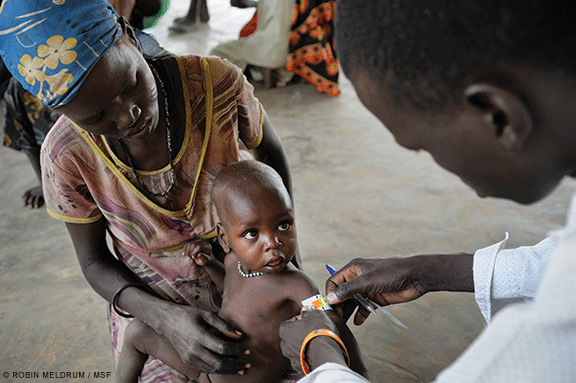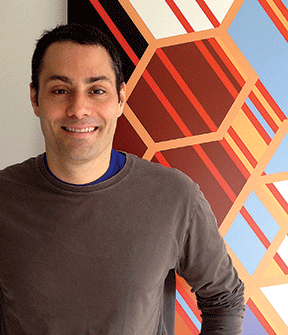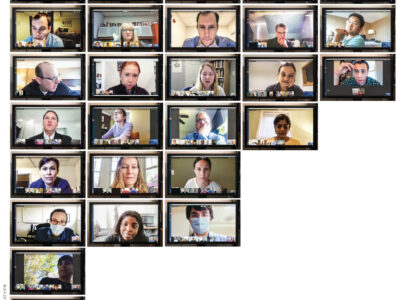
Class of ’98 | For Dan Goldring C’98 W’98, the greatest reward that comes from his efforts with Doctors Without Borders (MSF, for Médecins Sans Frontières) is when he hears the “harrowing and heroic stories of the men and women in the field.” They’re seldom for the faint of heart. Awful diseases and terrible wounds loom large, as do suffering and death. But even in brutal circumstances there are births and countless lives saved. Every year some 3,000 international MSF field staff provide “lifesaving medical assistance in more than 70 countries to people who would otherwise be denied access to even the most basic medical care,” he notes. And having spent time with quite a few “returnees,” he is invariably moved by the “joy and heartbreak of their experiences.”

Goldring co-chairs MSF’s advisory board, which he describes as a “group of interested outsiders” who help the organization, either through development efforts or “special skills that the MSF staff can draw on as needed.” (Having founded the successful investment firm Elementum Management, it seems fair to say that he’s in a position to help.) Goldring helps organize the group and “make sure that MSF is getting as much out of what we have to offer as possible.”
Globally, MSF “takes in and distributes more than $1 billion a year, which makes it a huge operation,” notes Goldring, who lives in New York with his wife Libby C’98 W’98 and their two children. While the organization has grown and matured since it was founded in 1971, its mission—“providing emergency healthcare in critical situations that do not otherwise have sufficient medical resources”—remains “at the forefront of everything we do.”
Numbers alone can’t convey the reality on the ground, yet they illuminate the scope of MSF’s operation and the formidable challenges it faces. Last year alone, says Goldring, the French-founded organization provided “9 million consultations, 77,000 surgeries, nearly 200,000 babies delivered, hundreds of thousands of malnourished children treated, 350,000 HIV patients [treated], along with all the trauma patients in war-torn countries like the Central African Republic, South Sudan, and Syria.”
Sometimes the world hears about what they do, such as during the 2010 earthquake in Haiti and this year’s Ebola outbreak. But there is “so much more medical need in the world that we never hear about at home,” Goldring notes. One way to learn more, including how to contribute, is by visiting www.doctorswithoutborders.org.
Another, more scholarly approach comes via a new book by Renée Fox Hon’11, the Annenberg Professor Emerita of the Social Sciences at Penn, titled Doctors Without Borders: Humanitarian Quests, Impossible Dreams of Médecins Sans Frontières, published this past April by Johns Hopkins University Press.
“We don’t take awareness of MSF for granted,” says Goldring. “It takes constant work to communicate with the public. All of these activities—interviews, panel discussions and events, webcasts, publications—are premised on our principles of transparency and accountability. It’s also vital that we share with the public the challenges that we face in the field and how we deal with them.”
MSF has another public to communicate with as well: “the public we see in the field every day,” Goldring notes. “MSF works so hard to gain acceptance and understanding across the more than 70 countries we’re active in, within the local populations and within the governments of those countries.” For its mission to succeed, “it’s imperative that the local population understand why we’re there, what we’re doing, that we’re neutral to any conflict, and that we do not have an interest in any political, religious, ethnic, economic, or military circumstance.”
One of the most daunting challenges now is the Ebola outbreak in West Africa, which MSF has been battling since March.
“MSF and the CDC are currently the only international [medical] organizations on the ground, along with the local ministries of health,” Goldring notes. “Unfortunately, the world is losing the fight to contain this outbreak. Immediate international action is still absent. Pledges of aid and support for the UN Security Council resolution won’t save lives until resources are actually deployed on the ground, and every day that is wasted means more lives lost. Infection rates are doubling every three weeks. The world is playing catch-up while the disease is speeding up.”
In the affected regions of West Africa, MSF employs 248 international staff and 2,800 locally hired staff, some of whom work at MSF’s six Ebola management centers, Goldring explains. “We provide a total of 549 beds in isolation. Since the outbreak began in March, MSF has admitted 3,299 patients, of whom 2,051 were confirmed cases of Ebola, and 650 have survived. More than 553 tons of supplies have been shipped to our centers so far, and our estimated budget for the Ebola outbreak in 2014 is 46.5 million euros.”
But, he adds: the “promised surge in resources and support has simply not been delivered. The sick are desperate, and there are many more infected people than there are beds to care for them. Aid workers are exhausted. While most MSF missions are for six to 12 months, the work rate in the Ebola disease-management centers is so arduous that we swap out workers every two to four weeks, which means that we need two or three people for each post. Fear and panic are setting in among the affected populations as the sick return to their villages.”
War represents a very different challenge, especially in places like Syria, where hundreds of thousands of civilians have died and aid workers have been brutally murdered.
“Syria is a very complex environment in which to provide humanitarian assistance,” Goldring says. “The risks are very high, and while we’ve had to adapt our operations there somewhat, MSF is still running several locations in Syria that provide lifesaving assistance. Additionally, we have extensive projects in Lebanon, Jordan, and northern Iraq, which are assisting the hundreds of thousands of Syrian refugees who have fled the violence in their own country.”
Doctors, nurses, and people with logistics backgrounds are always needed to work with MSF in the field, Goldring notes. But while “most of us aren’t qualified for fieldwork, financial support is crucial. Without our dedicated donors, this amazing work couldn’t happen. The ability to respond quickly to medical humanitarian emergencies is crucial to saving more lives, and giving unrestricted funds to MSF allows us to allocate our resources most efficiently to the areas of greatest need.”—S.H.




